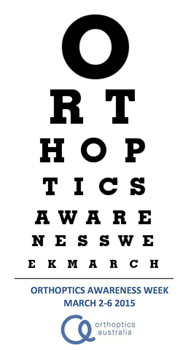Don't Turn A Blind Eye To Eye Health

Don't Turn A Blind Eye To Eye Health
The viral phenomenon of the gold and white dress (or is it black and blue?) brought the world's attention to our relationship with our eyes. We may all see different hues of colour or perceive things at different depths but our eyes are one of our most vital and precious organs.
Eyes can often be forgotten when we think of our own general health and wellbeing, with many of us putting up with squinting at our computers, struggling to read road signs or questioning our children's ability to distinguish shapes.
This week is Orthoptic Awareness Week (March 2 – 6, 2015), which is a reminder to Aussie's of all ages of the importance of eye health.
One of Australia's leading eye therapists Handan Otay notes 'Having experienced a range of eye health issues and treating hundreds of cases, this week is a good reminder of the simple preventative steps all of us can take everyday to maintain good eye health."
The importance of maintaining eye health has been highlighted by studies around the world, which have shown dramatic increases in the prevalence of myopia, particularly in urban locations in populations with intensive levels of education.
Professor Kathryn Rose, Head of Orthoptics at the University of Technology Sydney, adds that, 'environmental factors play a huge role in the development of myopia, however the growing rate of eye health issues related to myopia can be limited by changes to lifestyle."
Orthoptist Handan Otay adds, -the positive story here is that vision develops with maturity, meaning we have the ability to shape the future of our eyes.
Preventative measures have an even greater impact on children as Handan explains, 'What we do for children now will have a lasting impact on what they do in the future, so now is the time to ensure we are looking after our eyes so we can stay healthy for years to come."
Handan Otay has a few simple tips for looking after your eye health.
Simple tips for parents (and the kids) on how to look after your eye health:
Orthoptist, Handan Otay says;
Mum (or dad) knows best
The expression 'mother knows best' holds true in assessing eye health. In babies older than eight weeks, if you notice your child not being able to make eye contact or not being able follow a moving object, or making quick, often jerk like movements from side-to-side, not reacting to light, or their eyes not lining up evenly and tuning in or outwards, make sure you seek immediate testing.
Look for unusual behaviours
In older children, if you notice something about the way your child uses their eyes or they seem to behave differently to other children, even if they have normal-looking eyes, there may still be a problem.
Children with vision impairment may rub their eyes more often or have difficulty seeing things at night. They may also have hand-eye coordination issues and hold things closer to their faces. If any of these behaviours are consistent over time, seek assessment.
Orthoptist, Handan Otay says;
Don't worry unnecessarily about electronics
And that includes computers, gaming devices, smartphones and the television! You will not damage your eyes by using them. What could damage your eyesight are long periods of close work including studying, without being balanced by time spent outdoors. Getting out doors more often and having breaks from the computer can also relax the eyes and keep them healthy.
Be mindful of family history
The first warning sign is a family history of eye issues. If you, or a close family member, have an eye condition it's important to begin eye testing as early as possible. Eye tests are also important for young children. You can start at just six months of age, and if instructed by a specialist, follow up with regular check-ups. If you are having concerns about your eye health or vision, book in for check-up with an Orthoptist.
Carrots are not a myth
While good nutrition won't prevent you from underlining genetic- or illness-based vision impairment, for long-term eye health, based on supporting evidence from research, particularly the Age Related Eye Disease Study (2001 & 2006), Handan recommends a diet rich in Betacarotene (pro-vitamin A), found in carrots, Omega-3 fatty acids found in fish, and Antioxidants found in leafy green vegetables.
Look into the distance
Make sure you spend ample time outdoors in the sunshine, which helps prevent the development of myopia. Looking into distances further than six metres away also relaxes the eyes.
Orthoptic Awareness Week advocates eye health while also recognising the members, leaders and innovators at Orthoptics Australia working towards bettering eye care for the Australian public.
The week profiles the sometimes-misunderstood practice that is Orthoptics and profession that is Orthoptists, also known as -eye therapists'.
Orthoptics is a discipline in eye healthcare specialising in the assessment, diagnosis and non-surgical management of eye disorders. Although closely related, Orthoptics does differ from Optometry and Ophthalmology. For more information please visit www.orthoptics.org.au
Orthoptics Awareness Week runs from March 2 – 6, 2015.
MORE



